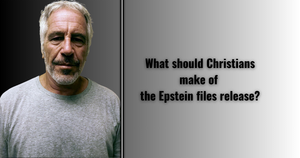Free speech has long been a major topic of conversation in America, but due to recent events in the US, the subject is at the forefront of many domestic debates. But what should Christians think about the idea? Is free speech compatible with Christianity?
The First Amendment to the United States Constitution says, in full, "Congress shall make no law respecting an establishment of religion, or prohibiting the free exercise thereof; or abridging the freedom of speech, or of the press; or the right of the people peaceably to assemble, and to petition the Government for a redress of grievances."
One of the major tenets of the first portion of the Bill of Rights is "freedom of speech."
The concept of freedom of speech is known by virtually every American, though exceedingly fewer understand what it truly means.
With the assassination of political pundit Charlie Kirk earlier this month, freedom of speech has become, arguably, the hottest topic of debate in this country. Many expressed hope that the tragedy would lead people with opposing viewpoints to tone down negativity and intentionally divisive rhetoric, but early returns from both liberals and conservatives have shown that hope to be an empty one.
Many have faced consequences for their public remarks regarding Kirk and his slaying, leading to misapplied claims of "But freedom of speech...!" from those who disagreed with whatever those consequences were.
The most prominent example came in the form of late-night talk show host Jimmy Kimmel. Kimmel made several insensitive comments following the murder, including some that featured inaccuracies. ABC suspended Kimmel from the airwaves for about a week before his reinstatement on Monday, though broadcast station owners Nexstar Media Group and Sinclair Broadcast Group–the two largest broadcast groups in the United States–remain committed to not airing Kimmel's show. (It is worth noting that Kimmel has apologized since.)
Several prominent figures in the US government (more on that later) have gotten involved in this crusade, claiming an intention to seek legal action against those who made certain insensitive comments about Kirk.
With all of the disagreement over what free speech is and isn't, what should Christians think about the fundamental American right?
Some facts about free speech
- Free speech is a restriction against the federal government's retaliation against or punishment for speech or expression. The First Amendment states that Congress will not make any law, prohibit the free exercise of, or, in an implied way, pursue legal action against someone for non-illegal speech. This means that freedom of expression is, primarily, a legal protection only.
- Free speech is not the freedom from consequences of speech. Public opinion, private relationships, and businesses are not obligated to ignore a person's words or behaviors. For example, businesses are firmly within their rights to fire an individual for posting on social media negative thoughts on Kirk's assassination, racist words, or other dehumanizing speech. In short, freedom of expression is not freedom from social or employment-related consequences.
- According to the American Library Association, there are several examples of speech and freedom of expression that are not protected by the First Amendment. This includes threats of violence, incitement of lawlessness, harassment, fraud, defamation, libel, obscenity, child endangerment, and more. In these instances, the government can pursue legal action against an individual.
- Free speech is also not the same all around the world. While most of the Western world claims to believe in similar interpretations of freedom of expression, there are some differences in how nations handle the human right. There are also other countries that don't allow for freedom of speech at all.
Some observations about free speech
- It seems as if many in the United States simply don't know what freedom of speech is. It also seems as if many US citizens don't truly care about liberty in expression unless it affects them in some way.
- For many Americans, free speech only seems to matter when it is someone on their side of the political aisle being affected. Public practices like "cancel culture" (which isn't really an issue of free speech in most cases) disproportionately sees individuals calling for action against people with whom they have political disagreement and disproportionately sees individuals defending those with whom they agree.
- Freedom of speech often is a false label used by individuals who wish to say (or write, express, etc.) something in a weaponized way. Essentially, if someone wants to get away with attacking someone else with words or with expressing false or offensive things, they often (incorrectly) cite free speech.
What the Left says about free speech
The majority of Democratic politicians in the United States support free speech. However, there are some disagreements as to what qualifies.
- Former President Joe Biden demonstrated his public platform on freedom of expression by offering support for journalism. He said in an official White House release in 2023 that "free press is a pillar of democracy" as it forces individuals and the government to be "self-critical" and "self-correcting."
- New York Senator Chuck Schumer called free speech "one of the great hallmarks of our country." However, Schumer has embodied the partisan idea that "the other side's speech shouldn't be free because I disagree with it" on many occasions.
- Other Democrats, like former Vice President and Presidential nominee Kamala Harris, support a tightening of free speech allowances. Harris said during her 2020 Vice Presidential campaign that private media companies that allow user postings (like social media companies) should do more to regulate what is posted on their platforms because users can "speak directly to millions and millions of people without any level of oversight and regulation." Back when he was a Senator in Florida, current Secretary of State Marco Rubio accused the Biden-Harris administration of colluding with several tech companies, most notably Facebook and Twitter, of deleting conservative social media posts and promoting liberal ones as a means of influencing elections. Later, it was revealed that the accusations were correct.
- "Misinformation" is a common talking point of the Left. However, there is no clear definition for the term or any indication of who or what should serve as the arbiter of truth. There have also been times in which politicians (both Republicans and Democrats) have incorrectly called something false, only for it to come out that it was true all along. At times, Democrats have even fought against clearly labeled satire publications. Combating falsehood is a good thing, but that isn't what many liberals mean when they reference fighting against misinformation.
- Democrats accuse Republicans of opposing free speech when it is beneficial for them to do so. In some cases, this is correct. In others, it is misdirection to hide the fact that they are doing the same thing.
What the Right says about free speech
There is a clearly unified Republican position supporting liberty of expression in the United States. However, there are some inconsistencies with how that is applied.
- Senator Rand Paul from Kentucky introduced the Free Speech Protection Act to Safeguard Americans earlier this year. Like many on the Right, Paul is concerned about the government or its contractors/partners censoring the American people.
- Utah Senator Mike Lee called freedom of speech "absolutely essential to the health of our republic."
- President Donald Trump has come under fire for his seeming dismissal of the First Amendment in the wake of political opposition. He has publicly expressed a desire, on multiple occasions, to seek retribution against individuals and/or media outlets who oppose him politically. While many on the Left exaggerate the extent to which Trump intends to respond to his opponents, the threats do exist. (It is worth noting, though, that some of these opponents did actually break the law and should face legal repercussions.)
- Trump-appointed United States Attorney General Pam Bondi recently threatened to arrest US citizens for hateful rhetoric, stating, "We will absolutely target you" for hate speech. A condemnation of hate speech is fine–it's good, even–but Bondi's comments were a severe overstep.
- Wyoming Senator Cynthia Lummis was once a major proponent of unfettered free speech. However, in the aftermath of the Kirk assassination and the sizable public reaction to it, she has relented, arguing that it should no longer be an "ultimate right" in America.
- Republicans accuse Democrats of opposing free speech when it is beneficial for them to do so. In some cases, this is correct. In others, it is misdirection to hide the fact that they are doing the same thing.
What the Bible says
"Freedom of speech" is not a phrase that is included within the pages of Scripture. However, personal liberty is a commonly discussed human right in the Bible.
First, God's Word is clear on personal liberty.
"For freedom Christ has set us free..." Those are the very first words of Galatians, chapter 5. Paul wrote this, under the guidance of the Holy Spirit, to express several truths, including the importance of personal liberty.
God is concerned with personal liberty because liberty and the ability to choose are essential for His people to have a genuine, personal relationship with Him.
However, because of the effects of the Fall, complete liberty is only possible for those who have been redeemed from their sin. Without a relationship with Christ, mankind is enslaved to sin. Salvation provides freedom, as the Lord gives His own Spirit to those whom He saves. 2 Corinthians 3:17 says, "Now the Lord is the Spirit, and where the Spirit of the Lord is, there is freedom."
Because of Christ's sacrifice, the Spirit of God dwells within believers. And Galatians 5:22-23 is clear about what type of behavior must overflow from Spirit-indwelled people. "But the fruit of the Spirit is love, joy, peace, patience, kindness, goodness, faithfulness, gentleness, self-control; against such things there is no law." True liberty–whether freedom of speech or otherwise–is found when a Christian walks in step with the Spirit.
In fact, true liberty requires a willing and joyful enslavement to Christ. Paul expressed this truth in Romans 6:20-23, "For when you were slaves of sin, you were free in regard to righteousness. But what fruit were you getting at that time from the things of which you are now ashamed? For the end of those things is death. But now that you have been set free from sin and have become slaves of God, the fruit you get leads to sanctification and its end, eternal life. For the wages of sin is death, but the free gift of God is eternal life in Christ Jesus our Lord."
Free speech and personal liberty are, in no way, an excuse for sin.
Within freedom and liberty, mankind has the ability to speak and behave in any way they choose...just as long as their thoughts, words, and actions adhere to God's Law.
Contrary to what many seem to believe, freedom of speech (or freedom of action) does not literally give an individual the freedom to do whatever they like without consequence.
The Lord instructs His people regarding their pursuits of holiness. As that relates to freedom of speech, Scripture includes several clear commands from God.
Speaking through Paul, He says in Ephesians 4:29, "Let no corrupting talk come out of your mouths, but only such as is good for building up, as fits the occasion, that it may give grace to those who hear."
The Apostle also shares in Colossians 4:6 God's desire for His people's speech to "always be gracious."
The Word of God prohibits obscene talk (Colossians 3:8), slander (Leviticus 19:16), gossip (2 Corinthians 12:20), speaking falsehoods (Exodus 20:16), divisive words (1 Timothy 6:3-5), and many other types of verbal sin.
James 1:19 adds, "Know this, my beloved brothers: let every person be quick to hear, slow to speak, slow to anger." and Proverbs 10:19 says, "When words are many, transgression is not lacking, but whoever restrains his lips is prudent."
For those who are in Christ, there is forgiveness from sins, but Christians have no right to continue sinning so as to take advantage of the Messiah's grace and mercy. "What shall we say then? Are we to continue in sin that grace may abound? By no means! How can we who died to sin still live in it?" (Romans 6:1-2).
Plus, perhaps most importantly, there is direct command from the Lord to acknowledge Him. Romans 10:9 ("if you confess with your mouth that Jesus is Lord and believe in your heart that God raised him from the dead, you will be saved") expresses this thought.
The tongue is a picture of what lies within the heart.
Much like God's allowance of free moral choice, so too the granting of free speech in the US has resulted in opportunities for sinful speech. This does not make God guilty or place fault on of the United States Constitution. Instead, it is the fault of the sinfulness that lies within the human heart. Wickedness that is inside will always come out eventually.
In Matthew 15:10-11, Jesus taught, "And he called the people to him and said to them, 'Hear and understand: it is not what goes into the mouth that defiles a person, but what comes out of the mouth; this defiles a person.'”
A few chapters earlier, when confronting the wicked moneychangers and merchants in the temple (whom He called "a brood of vipers"), Jesus also explained in Matthew 12:34, "For out of the abundance of the heart the mouth speaks."
The tongue is powerful, and everything that is within a person's heart will come out of his/her mouth. Once it does, words can spread quickly. James 3:5 says, "So also the tongue is a small member, yet it boasts of great things."
Truth matters.
In John 14:6, Jesus refers to Himself as "...the Way, the Truth, and the Life.", and in John 17:17, He says that God's Word (another name given to Himself earlier in John 1:1) "is Truth."
Because of this reality, believers must remain committed to Truth.
In fighting for God's Truth, Christians are required to use their voices. In Ephesians 4:25, the Bible is clear: "Therefore, having put away falsehood, let each one of you speak the truth with his neighbor, for we are members one of another."
Jesus' disciple Peter, in 1 Peter 3:15, reminds his readers to always be ready to defend their faith, and to do so with Christ-honoring respect. "...in your hearts honor Christ the Lord as holy, always being prepared to make a defense to anyone who asks you for a reason for the hope that is in you; yet do it with gentleness and respect."
Taming the tongue does not necessarily mean that everyone will like what Christians have to say. Even so, believers must be willing to exercise their right to free speech for the Lord's sake.
One of the greatest benefits of freedom of speech is seen in the ability of a person to say things that others disagree with or to say things that make others uncomfortable. After all, the Bible is clear that the Truth of God is offensive to those who do not wish to hear it (Romans 9:30-33).
Many conflate "niceness" with Christlikeness. In many cases, simple kindness is a great picture of the Savior's love. However, the most loving thing a person can do is to expose others to the Truth, even when it is difficult to hear. Sometimes that requires firmer words.
To faithfully honor the command to always be "speaking the Truth in love" (Ephesians 4:15), Christians must, at times, exercise their right to free speech to deliver unpopular messages. Jesus warned in John 15 that the world will hate His people, just as the world hated Him.
Final verdict
Because the Lord has granted liberty to His people, the right to free speech is a fundamental one that the founders of the United States understood well.
However, free speech is not "protected" legally when dealing with certain sinful behaviors, such as threats of violence and incitement of lawlessness. This also follows biblical principle.
The responsibilities that come with the gift of free speech are many, but for the Christian, they can be summarized simply: believers are to honor God and others with their words, to always remain committed to the Truth, and to intentionally proclaim the gospel of Christ to themselves and the world around them.




